In early 2022, I started Writing Games with a simple goal: to shine a spotlight on the world of text-based games.
What began as a hobby blog grew into a resource for fellow enthusiasts and new players discovering MU* games for the very first time.
Along the way, I’ve had the pleasure of interviewing incredible people, too. Players, writers, and game creators who bring amazing games to life. Sharing their insights with the community has been one of my favorite parts of this blog.
So, in celebration of the site’s third anniversary, I’d like to take a look back at these earlier interviews. The plan? To highlight some of the best quotes and key takeaways from each.
My hope is that whether you’re an expert or beginner, a player or creator, you’ll find something to inspire your next text-based pursuit. 😊
Table of Contents
- Year 1: accessibility, community, and inclusive game design
- Aaron: gaming with partial sight (April 10, 2022)
- Niamh: making MU*s more accessible (April 17, 2022)
- TBQ: gaming with chronic illness (April 29, 2022)
- Klor: getting player buy-in and feedback (June 4, 2022)
- Dale: improving representation in games (May 4, 2022)
- Shadowfax: maintaining a thriving game (October 23, 2022)
- Ash and Famine: designing an inclusive RP game (February 8, 2023)
- Key takeaways from year 1 of Writing Games
- What's next for Writing Games
- Frequently Asked Questions
Year 1: accessibility, community, and inclusive game design

The first year of Writing Games was all about creating more inclusive, accessible, and community-focused approach to text-based gaming.
My conversations with interviewees ranged from making games more screen reader-friendly to building roleplay spaces that welcome everyone.
Here are some of the highlights from year 1:
Aaron: gaming with partial sight (April 10, 2022)
“I think in the case of RP games, there can come a point where you’re in an environment that asks too much of you. For people with mental illness, like myself, you can leave at any time, and if you pick a good game to play, they’ll let you do that and not give you grief.” – Aaron Weaver, gamer & musician
In my very first interview, Aaron shared his experiences navigating the gaming world with partial sight. From video games to multi-user dungeons (MUDs), Aaron discussed what works, what doesn’t, and what he looks for in a game and its community.
Talking to Aaron made me realize how much we, as players, have in common regardless of ability. We all want similar things–deep worlds, engaging mechanics, and a sense of community.
But for players with low vision, unnecessary barriers can turn a great game into an frustrating one.
Aaron helps us understand:
- why audio beacons, screen reader support, and configuration options matter
- how ASCII maps and fast-faced combat create barriers for players
- what game developers are doing right and where they’re still falling short
Niamh: making MU*s more accessible (April 17, 2022)
“Definitely talk to players who use screen readers and get their input. Delve as deep as they’re comfortable with you delving about what the experience is like, where there are weak spots, and the best ways you can use the game output to signal things a sighted user or admin might never have considered.” – Niamh, Implementor of Alter Epoch
In my first interview with Niamh, she shared how she improved accessibility in Alter Epoch to make it more inclusive. From screen reader-friendly features to adapting ASCII-heavy systems, she explains the practical changes that ensure a universal experience for everyone.
Niamh’s insights reinforce the importance of talking to players and getting their feedback. That the best way to design for accessibility isn’t to guess or assume–it’s to listen, learn, and implement focused changes based on their experiences.
Niamh helps us understand:
- how even small improvements can make a big impact for players
- why working directly with players with visual disabilities is so important
- practical tips for game developers looking to make their own games more inclusive
TBQ: gaming with chronic illness (April 29, 2022)
“There’s no one way to play a game. If you’re having fun and nobody else is being hurt by it, that’s the right way for the game to be played.” – TBQ, writer & roleplayer
In my interview with TBQ, she shared her experiences gaming while living with chronic illness. She talked about the challenges of fatigue, memory issues, and anxiety, and why features like difficulty modes and flexible RPG mechanics can make or break a game for players with disabilities.
Before this conversation, I hadn’t fully considered how much pressure players with chronic illness put on themselves to “keep up” in games. TBQ’s perspective made me realize that accessibility isn’t just about mechanics–it’s also about creating a gaming culture that values different playstyles and respects individual limits.
TBQ helps us understand:
- why difficulty modes matter and how they make gaming more inclusive
- how chronic illness affects memory, focus, and energy levels while playing
- how patience and understanding from fellow roleplayers can improve the experience
Klor: getting player buy-in and feedback (June 4, 2022)
“[The keyword color code] didn’t have the biggest impact from an overall game standpoint, but it was the easiest to get buy-in from the player base. That’s one of the biggest things to keep in mind with any change—how will the players take to it?” – Klor, LOTJ staffer
In my interview with Klor, he shared the accessibility improvements made in Legends of the Jedi (LOTJ), an RP MU* set in the Star Wars universe. He explained the challenge of making a game more accessible while ensuring that new features are intuitive, well-received by the community, and enhance the experience for everyone.
Klor’s insights teach us that even the best-designed improvements won’t be effective unless the community understands them, accepts them, and integrates them into gameplay.
Klor helps us understand:
- how keyword color codes to improve readability without disrupting gameplay
- why accessibility features need to be intuitive and fit naturally into the player experience
- how reducing excessive text spam—especially in combat—helps big time
Dale: improving representation in games (May 4, 2022)
“Even though ~20% of the real world population is disabled, disability is nearly nonexistent in fantasy gaming besides the occasional pirate or blind martial artist, and mental illness appears in the form of ‘madness’ mechanics that make the stigma worse and actively keep people from getting help when they need it.” – Dale Critchley, Wyrmworks Publishing
In my interview with Dale, he shared how he turned a passion for gaming into a mission for better representation and accessibility. Through Limitless Heroics, he’s working to ensure that people with disabilities, mental illness, and neurodivergence are included–not as stereotypes, but as fully realized characters and creators.
Even though Dale’s main focus is on tabletop games, I found that a lot of his insights were applicable to MU*s as well. For example, his approach to accessibility isn’t just about adding features–it’s about making sure the people most affected are involved in the process.
Dale helps us understand:
- how common accessibility issues in gaming contribute to harmful stereotypes
- why inclusion means involving creators with disabilities, not just writing about them
- what both players and publishers can do to make gaming spaces more welcoming
Shadowfax: maintaining a thriving game (October 23, 2022)
“A major point of interest is our support for visually impaired players. This was accomplished in large part by the efforts of Morpheus, who is blind. He worked with Dentin over the years to [implement accessibility improvements], not only for visually impaired players but also for builders, too.” – Shadowfax, Alter Aeon staffer
In my interview with Shadowfax, he shared his thoughts on why Alter Aeon has been able to stay active for nearly three decades. By listening to players and making accessibility a core part of the game’s design, the staff built a dedicated and diverse player base that keeps coming back.
It would be easy to think that a MUD’s longevity is all about content updates and player numbers, but Alter Aeon teaches us that there’s more to it: true staying power comes from creating a welcoming experience.
Shadowfax helps us understand:
- the benefits of having a fully accessible game client tailored players with visual disabilities
- how sound design and audio cues can make text-based gameplay more immersive
- what the team learned from past mistakes, including why their PvP system didn’t work
Ash and Famine: designing an inclusive RP game (February 8, 2023)
“It wasn’t a tough question, really. None of us wanted [a setting that reflected the misogyny, homophobia, racism, and transphobia of the time period]. There’s enough bigotry to contend with in real life without dragging it into our game.” – Ash, co-creator of The Free Zone
“Our belief is that if someone is coming to play our game, they should feel welcome to play something that they’re comfortable with.” – Famine, co-creator of The Free Zone
In my interview with Ash and Famine, they discussed how they built The Free Zone (TFZ) with inclusivity in mind from the start. From setting design to character options, many aspects of the game were shaped to support a welcoming and immersive RP experience.
Instead of forcing players into a rigid vision, Ash and Famine embraced the community’s natural playstyle and preferences. I found this to be a refreshing and thoughtful approach, different from the way most other RP MUDs operate.
Ash and Famine help us understand:
- how games can prioritize inclusivity without sacrificing theme or immersion
- how separating gender from biological sex can improve the player experience
- important lessons about designing a game for player engagement
Key takeaways from year 1 of Writing Games

Taken together, here’s some of the best advice interviewees had to offer game creators in year 1:
- regularly check in with players and find out what would make their experience better
- provide players with easy-to-use tools to help support your accessibility mission (the interviews with Niamh and Klor are packed with really great examples!)
- give players in-game options that align with the kind of community you want to create, whether that means adding new pronouns, allowing them to opt out of PvP, or providing a way to slow down or limit text output
- if your game’s theme doesn’t fit the kind of community or culture you want surrounding your game, don’t be afraid to change it
And for both players and game creators:
- strive to have patience with your fellow players and staff–you can’t always know what the person on the other end of the screen is dealing with IRL
- respect others’ playstyles and limits; if they aren’t harming you or undermining the spirit of the game, there’s nothing worth getting bent out of shape over
- prioritize your well-being and respect your own limits; walk away when you need to
- likewise, let people take breaks when they need them, without guilt or pressure
Other benefits of designing accessible games
Lastly, one final takeaway from the first year is how improvements designed for screen readers can often create a better experience outside of that use case, too.
For example, the ability to gag spammy combat text makes a fast-paced game easier for everyone to follow, including those who play on mobile.
Similarly, when playing a MU* on a small screen, decorative ASCII is harder to appreciate and often just gets in the way. Giving players a way to hide ASCII when they want can reduce friction and make it easier for them to play via their phones.
These examples reinforce a core tenet of web accessibility: that improvements often benefit everyone, regardless of ability.
What’s next for Writing Games
Before I wrap this up, I want to extend a warm thank you to my interviewees and readers. The past 3 years wouldn’t be possible without you, and I truly appreciate the time you’ve given me.
Looking ahead, I’d like to recap years 2 and 3, as well. All of my interviewees have had such great insights and advice.
It’s funny, actually. I never feel like I have enough time to write–and I always wish I could publish more posts, but somehow there’s more than enough content to highlight in an annual recap. 😂
Speaking of which, I’d love to highlight a few new games and game creators this year. If you know of a good project, please don’t hesitate to reach out!
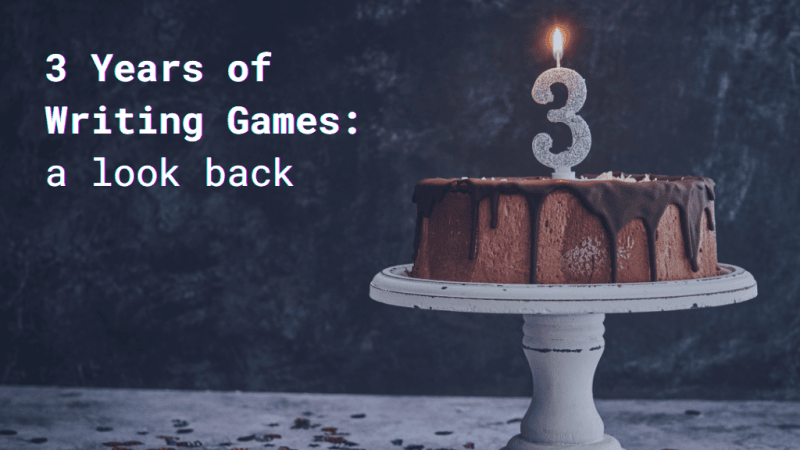

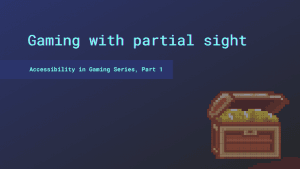
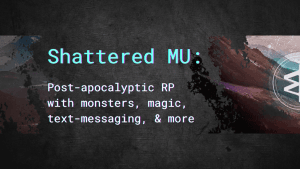
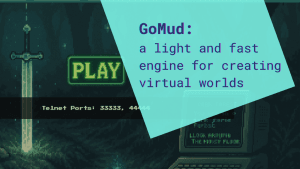
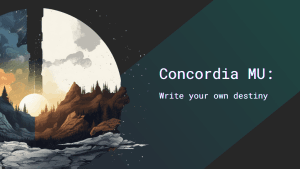
Leave a Comment